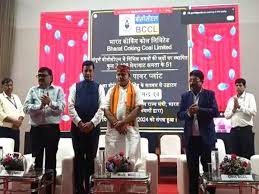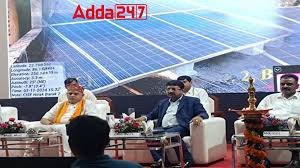Union MoS Satish Dubey Inaugurates 51 Solar Plants and Felicitates Hackathon Winners
Introduction
Union Minister of State (MoS) Satish Dubey recently inaugurated 51 solar power plants in India, marking a significant step towards renewable energy adoption in the country. This initiative is expected to enhance India’s clean energy capacity while simultaneously addressing the nation’s growing energy needs. The event also recognized the achievements of young innovators, with the minister felicitating the winners of a nationwide hackathon. The dual focus of the event emphasized the government’s commitment to promoting both sustainable energy solutions and innovation among youth.
Solar Power Plants: A Step Towards Sustainability
The Need for Renewable Energy
The inauguration of 51 solar power plants aligns with India’s ongoing efforts to shift from fossil fuels to renewable energy sources. With an ever-increasing demand for electricity, the adoption of solar energy helps to reduce dependency on non-renewable sources. It supports the global goal of reducing carbon emissions and promotes sustainable development. This initiative demonstrates India’s dedication to meeting its renewable energy targets, as outlined in the Paris Agreement.
Impact of the New Solar Installations
These newly inaugurated solar plants are expected to add significant capacity to the existing solar energy infrastructure in India. The move aims to ensure energy security for remote and underdeveloped regions that face frequent power shortages. By harnessing solar power, these areas can become self-reliant in energy production, leading to economic and social benefits. Additionally, it encourages local job creation through the need for plant maintenance and management.
Felicitation of Hackathon Winners
Promoting Innovation Among Youth
During the same event, Union MoS Satish Dubey honored the winners of a national-level hackathon aimed at fostering innovation in technology and sustainable solutions. The hackathon provided a platform for young minds to develop practical solutions to current challenges, such as energy efficiency and digital transformation. Recognizing their efforts serves to motivate other students to explore the fields of science, technology, engineering, and mathematics (STEM).
Encouraging Digital and Technological Growth
The government’s emphasis on supporting hackathons and similar initiatives reflects a broader vision of making India a global leader in technology and innovation. By encouraging youth to participate in such programs, the government aims to build a tech-savvy generation capable of addressing the challenges of the future. This initiative aligns with India’s digital growth agenda and helps in nurturing a culture of creativity and problem-solving.

Why This News is Important
Boost to India’s Renewable Energy Goals
The inauguration of 51 solar power plants plays a critical role in meeting India’s renewable energy targets. It contributes to the nation’s larger goal of achieving a sustainable and self-reliant energy system. This move is particularly important in the context of India’s commitment to reducing carbon footprints and adhering to international climate agreements.
Promotion of Innovation Through Hackathons
By recognizing the winners of the hackathon, the government is actively encouraging a culture of innovation among the youth. This helps in bridging the gap between academic knowledge and practical applications. For students preparing for competitive exams, understanding the government’s focus on youth empowerment and technological growth is crucial, as it reflects India’s policy directions.
Significance for Government Exams
The dual emphasis on renewable energy and innovation makes this news story particularly relevant for aspirants of government exams like PSCS, IAS, and other state-level exams. Topics such as renewable energy, sustainable development, and digital transformation frequently appear in the syllabus, making this article valuable for exam preparation.
Historical Context
India’s Journey Towards Renewable Energy
India’s focus on renewable energy began in the early 2000s, with initiatives aimed at reducing dependence on coal and fossil fuels. The National Solar Mission, launched in 2010, set the stage for rapid solar energy development, targeting 100 GW of solar capacity by 2022. This ambitious goal has led to increased investments in solar infrastructure and policy support from the government.
Rise of Hackathons and Tech Initiatives in India
Hackathons have become popular in India over the last decade as part of the government’s efforts to encourage innovation and entrepreneurship. Programs like Smart India Hackathon and various state-level competitions aim to involve students in solving real-world problems using technology. These events help foster a culture of innovation and provide a platform for young minds to showcase their skills.
Key Takeaways from “Union MoS Satish Dubey Inaugurates 51 Solar Plants and Felicitates Hackathon Winners”
| Serial Number | Key Takeaway |
|---|---|
| 1 | Union MoS Satish Dubey inaugurated 51 solar power plants, enhancing India’s renewable energy capacity. |
| 2 | The event highlighted the government’s commitment to clean energy and reducing carbon emissions. |
| 3 | The inauguration aims to address energy needs in remote regions, promoting self-reliance. |
| 4 | The hackathon recognized young innovators, fostering a culture of innovation and technology in India. |
| 5 | The initiatives align with India’s goals of sustainable development and digital growth, making them relevant for competitive exam preparation. |
Important FAQs for Students from this News
1. What are the key benefits of solar power plants?
Solar power plants help reduce reliance on fossil fuels, decrease carbon emissions, promote energy independence, and provide sustainable energy solutions, especially for remote areas.
2. How does the Indian government support renewable energy initiatives?
The Indian government has launched various policies and missions, such as the National Solar Mission, which aims to promote solar energy adoption and set ambitious capacity targets.
3. What role do hackathons play in fostering innovation?
Hackathons encourage participants to develop practical solutions to real-world problems, helping to bridge the gap between academic knowledge and practical application while promoting teamwork and creativity.
4. Why is the recognition of young innovators important?
Recognizing young innovators motivates other students to engage in STEM fields and contributes to a culture of innovation, which is crucial for addressing future challenges in technology and sustainability.
5. How can students prepare for exams related to renewable energy topics?
Students should stay informed about current developments in renewable energy, understand government initiatives, and engage with educational resources that cover the environmental policies and technological advancements in India.
Some Important Current Affairs Links


